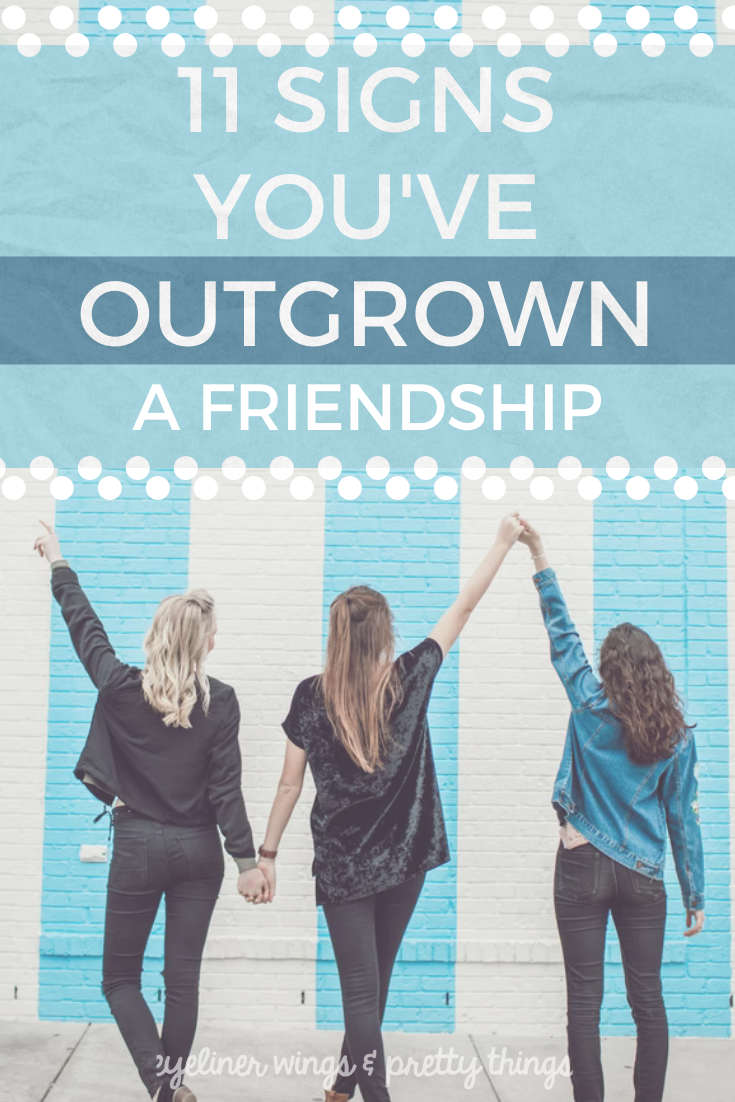
I often feel like I don’t have a lot of advice to offer because I’m still figuring things out myself, but in figuring things out I do learn some pretty valuable lessons. Something I learned recently is that it’s OK to outgrow a friendship.
I’m someone whose instinct is to cling to friendships with people I love, even when they’re probably not the best for me. It’s definitely something I’ve been working on and, recently, I was really put to the test.
Having other healthy friendships made me realize that just because someone was an important part of your life once doesn’t mean they’re a permanent fixture. As with any relationship, friends can grow together or grow apart.
Here are signs you’ve outgrown a friendship and may want to reassess.
Your conversations feel like they require effort
Talking to a friend should never be difficult but if you find yourself struggling to think of topics to talk about or putting on your best “phone call voice” for them, it may be a sign you no longer have as much in common as you thought.
You don’t feel like you can be honest with them anymore
I had friends who I was genuinely concerned about, but I felt like all I could do is watch them do what they were doing and say nothing at all.
I didn’t think I could tell them the truth — or I felt that if I did it wouldn’t go over well or it’d cause some kind of strain.
But, at least for someone like me, if I can’t be honest with someone it means I don’t feel all that close to them anymore. It’s the truest test. Honesty is the key to relationships and if you can’t tell your friend how you really feel, it might be a sign you’ve grown too far apart.
Sometimes you forget to keep them in the loop, even with major life events
When I moved in with my boyfriend, I realized, there were some close friends I fully forgot to keep in the loop. I felt really bad about it, but then it just made me realize I didn’t necessarily know what was going on with them either.
It made me wonder how close I really was to them if I didn’t even think to mention this milestone to them because of how infrequently we’d been talking or how surface-level things had become.
Most of what you have in common are memories
It’s nice to reminisce and feel nostalgia, but if most of what you have in common is events from the past it’s hard to move forward.
Other important people in your life are waving the red flags
I’m the queen of raising red flags for other people. When my friends go on dates or send me screenshots of conversations, I have eagle-eyed focus and can find those warning signs, no problem. But when it comes to friendships in my own life, I definitely have a blind spot.
In a lot of situations I’ve had to rely on other important people in my life to call out the red flags in friendships I was holding onto. And although I tried to push back with “But we’ve been friends for so long” and “But I know this is not really who she is” and other excuses, that doesn’t cancel out the warning signs.
Sometimes it’s hard to take off those rose-colored glasses and recognize when you’re not being treated right. In those cases, it’s OK to turn to outside sources who are looking out for you for backup, even if it’s hard to believe.
Your core values are too different
You don’t need to be a carbon copy of your friends, but if you find that you’re not on the same page about some of the things you believe in most, it might be time to reassess.
For me, seeing how some people in my life responded to recent major events like the global pandemic (traveling like it’s going out of style before you’re vaccinated…oof) and the Black Lives Matter protests (please don’t tell me you’re posting about how All Lives Matter) made me think. These things pushed me closer to people who I knew had core values that aligned with mine and led me further apart from those whose logic I just couldn’t quite understand.
You genuinely feel like you don’t know them anymore
Sometimes people you thought you knew become utterly unrecognizable, whether they’re going through some kind of crisis or are unaware they’re being wildly manipulated by someone else. You can’t do anything about it, is the hard part, especially if they have a negative influence who’s constantly whispering in their ear and getting their way.
I can’t tell you how many times I’ve wanted to shake some people and say, “Do you hear yourself? You are completely unrecognizable. I know this isn’t the way you are and you’re better than this.” But it’s up to them to realize that stuff and work on it themselves. Even if you know it’s true, you’ll eventually feel like you’re going crazy trying to talk to someone about it.
No one really wants to hear that they’ve changed and it’s probably hard to notice if they no longer have a lot of people in their life actually calling them out on their bullshit.
You can’t have a reasonable conversation about the things that are wrong
OK, you’ve decided to try to repair things. You’re going to just lay it all on the table. You’re trying to keep it cool, be fair, and be honest.
But they twist your words and try to make you feel like you’re in the wrong for feeling some type of way. Ouch. Some friendships are worth fighting for but sometimes it’s good to know when you need space or time.
I tried recently to tell a friend that I wasn’t sure if we’d ever be as close as we once were because of how far apart we’d grown and a few recent rifts, but that I cared about her, had no hard feelings, and would still like us to work on our friendship. She agreed by the time we hung up the phone, but hours later she was telling everyone I was so mean to her and I said our friendship never mattered. Weeks later, she sent me a nasty text message attacking me about a conversation that I knew didn’t happen the way she said. Then, as a parting message, she told me to go f— myself.
I felt like I was absolutely losing my mind because logic and truth, the only weapons I had, were powerless. You can’t reason with someone who is incredibly hurt by something that you know never said. The situation made me feel like an innocent person on trial but the jury wouldn’t even hear me out because the accuser got to them first and cried harder.
It was surreal and hurtful, but eventually, I realized it was just more proof that, no, we would never be that close. I don’t need friends who twist my words and go behind my back instead of to my face. We couldn’t have those reasonable conversations, apparently, and I didn’t like that she manipulated my words to something that was untrue.
It was hard but…
… if someone shows their true colors, believe them
Seeing how quickly my friend flipped and twisted my words was eye-opening. But when I spent many, many hours thinking about it I wasn’t as surprised as I thought. I remembered how she used to talk about her other friends to me, complaining about them for hours and then hanging out with them all smiles the next day. I thought that maybe I was “safe” because I was closer to her, but then I realized it was kind of silly to think that way.
People show who they really are all of the time. If someone has a pattern, believe it. If someone does something out of character, try to dig into it.
I was hurt that one of my other friends believed the awful things my other friend was saying I supposedly said, especially because these things were completely out of character for me. I would never, ever tell someone their friendship meant nothing to me (how can that be true?) and I was hurt most of all when another close friend believed I said that with vitriol.
But when it’s he said, she said and the lines have been drawn, saying, “You know me! Believe me!” can only do so much.
Time is your biggest argument to stay
If the amount of time you’ve been friends with someone is the main reason you’re holding onto the relationship, you need to reflect. Ending a friendship doesn’t invalidate how much they meant to you or the good times you had. Sure, it leaves a dark and bittersweet mark on a lot of memories, but sometimes it’s for the best to move forward.
You find yourself having more fun with people you’ve known for less time
I’ve recently made some great new friends that I went on trips with and got brunch with. I also had an amazing time at a meet-up of local twentysomethings who I’d never previously met. All of that helped me realize that I don’t need to have long-standing friendships in my life that aren’t working.
I’m capable of having healthy friendships and good times with new people. I can make new memories. You don’t stop making friends after college, even though it’s harder.
But, of course, even when there are many signs you’ve outgrown a friendship, saying goodbye to a friend is easier said than done
It’s incredibly painful to lose friendships and it’s something I still think about very often. You can feel powerless and confused. Some days you’ll feel justified and glad it happened. Sometimes you’ll mute their stories on Instagram and other times you’ll just take a peek. Maybe someday, in time, you’ll reconnect.
Whether you slowly fade out or have a parting conversation, I just suggest that you don’t suddenly end a years-long friendship over text message unless you’re trying to go for the jugular and leave some scars. (Can you tell I’m still deeply hurt and confused?)
Still, even if you lose a friend, remember that the relationship was probably once really great and what you needed at a time in your life. Try to look back as fondly as you can, even if things didn’t go how you’d hoped.






